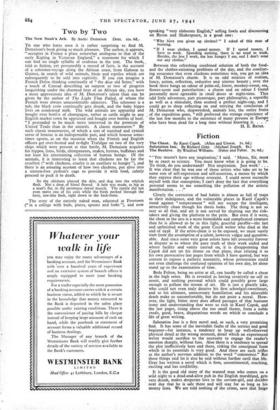Two by Two
The New Noah's Ark. By Andre Demaison Dent. los. 6d.) To one who hates zoos it is rather surprising to find M. Demaison's book giving so much pleasure. The author, it appears, " occupies in France a place somewhat analogous to that of the early Kipling in Victorian England," a statement for which I can find no single syllable of evidence in the text. The book, . told as fiction, yet presumably a record of facts, is the account of a schooner-voyage along the African coast, from Gaboon to Guinea, in search of wild animals, birds and reptiles which are subsequently to be sold into captivity. If you can imagine a French Defoe thinking continually of " the dear old Seine," with a touch of Conrad describing an outpost or two of progress languishing under the charmed heat of an African sky, you have a more approximate idea of M. Demaison's talent than can be given by the author of The Light That Failed, of whom the French were always unaccountable admirers. The schooner is a tub, the black crew continually gets drunk, and the baby hippo lives on condensed milk. The wild animals are appraised and bought over bottles of champagne, rather as cattle might in any English market town be appraised and bought over bottles of beer. " I pretended to be much more interested in the promises of United Trade than in the animals. A classic manoeuvre." By such classic manoeuvres, of which a sort of starched and cynical sense of honour is an indispensable part, and which honour some- times upsets, as on the occasion when the French and English officers get over-heated and re-fight Trafalgar on two of the very ships which were present at that battle, M. Demaison acquires his hippos, lions, birds, chimpanzees, snakes, hyenas, buffaloes and not least his entertaining collection of human beings. Of the animals, it is interesting to learn that chickens are by far the cruellest (" with chickens, cruelty is an auxiliary to hunger "), and there is an amazing account of how two chickens, put alive into a sixteen-foot python's cage to provide it with food, calmly proceed to peck it to death.
So the chickens pierced the skin, and dug into the whitish flesh. Not a drop, of blood flowed. A hole was made, as big as a man's fist, in the enormous dorsal muscle. The reptile did not even move one of his coils while the birds pecked through the fatty, tow-like flesh, right down to the back-bone.
The story of the entirely naked man, educated at Freetown (" in a college with beds, plates, spoons and forks "), and now
speaking " very elaborate English," selling fowls and discoursing on Byron and Shakespeare, is a good one : " Why have you given up clothes? " I asked of this man of learning.
" If I wear clothes, I spend money. If I spend money, I have to work. Spending nothing, there is no need to work. Besides, the less I work, the less hungry I am, and I don't wear out any clothes."
Between this refreshing combined solution of both the food- and the clothes-rationing problems of the day, and the comfort- ing assurance that even chickens sometimes win, you get an idea of M. Demaison's charm. It is an odd mixture of realism, fancy, action, reflection, seductive and sinister beauty ; over the book there hangs an odour of palm-oil, forest, monkey-sweat, sea, flower-scent and putrefaction: a charm and an odour I found personally most agreeable in mall doses at night-time. This odd little adventure, part picaresque, part philosophic, a soporific as well as a stimulant, then seemed a perfect night-cap, and I could go to sleep reflecting on and envying the conclusion of M. Demaison who, shipwrecked, animals lost, the entire fruits of the expedition gone, " still preferred the strange .experience of the last few months to the existence of many persons in Europe who have been dead for a long time without knowing it. . . ."
H. E. BATES.






















 Previous page
Previous page